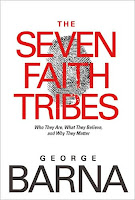The first book I read with George Barna’s name on it was Revolution. It was one of those powerful books that confirmed a lot of things I was seeing, and helped reshape my thinking.
The next book with his name on it was his collaboration with Frank Viola in re-releasing Pagan Christianity. This book ticked me off; in fact, I wrote a review on this blog about it. But over the long haul, I have to admit…despite the inflammatory tone, the information in Pagan Christianity has also deeply influenced my views and shaped my thinking.
This book, The Seven Faith Tribes? Not so much.
In my view, there are several fatal flaws in the book that make it far less than it could have been….
First–while the book acknowledges over 200 different expressions of religion in the United States, it attempts to boil them down to seven tribes. It is statistically impossible to do this without creating irreconcilable contradictions–it just crunches the data too much. One glaring example is the claim that one-third of all atheists/agnostics hold to an orthodox view of God and believe that He exists. (Hello? Doesn’t that defy the definition of either?) I don’t think many people will really see themselves in this book, or identify with any one tribe in particular, because there are just too many generalizations and contradictions.
Second–there is an alarmist tone in the book that seems out of character for a statistics guy. (For example, Chapter One: “America Is On the Path to Self-Destruction.”) While I’m not disputing his assessment per se, it just seems a bit unbelievable that a pollster would carry that strong an agenda in his writing, when most pollsters simply allow the data to speak for itself. It comes across with such a strong tone that it is off putting, and potentially damages his credibility.
Third–the theme of the book (essentially, how the seven faith tribes in America can focus on their common values to help America stop its downward spiral) honestly comes across as contrived for me. It just seems like a book about the seven faith tribes would have something more to do with revealing the kingdom of God than rescuing America, or that a book about rescuing America would take a different approach altogether. From the beginning, associating this data with this agenda doesn’t seem to fit, and is a line of thinking I can’t see most people connecting with.
Fourth–the book admits that it is a book about “big ideas”, but really does not make connection with the size audience it would need to bring those big ideas to reality. While describing the seven faith tribes, in reality it is only likely to reach one of the seven tribes Barna describes–mainly the “Captive Christians”. The premise of the seven faith tribes coming together around their shared interests requires being able to reach out to all seven tribes, and I don’t see this book having that kind of audience, especially with the conservative worldview the book itself carries.
So all told, the book was disappointing for me, and I lost interest early on simply because I had a hard time connecting with the premise. The data and research are useful enough; it’s just that I felt they could have been applied in a more practical way.
This book review is part of TheOoze Viral Bloggers.
